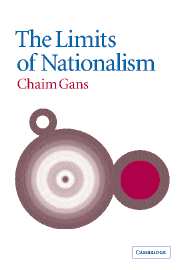Book contents
- Frontmatter
- Contents
- Acknowledgements
- Introduction
- 1 Nationalist ideologies – a normative typology
- 2 The liberal foundations of cultural nationalism
- 3 National self-determination
- 4 Historical rights and homelands
- 5 Nationalism and immigration
- 6 Nationalism, particularism and cosmopolitanism
- 7 Conclusion
- Bibliography
- Index
4 - Historical rights and homelands
Published online by Cambridge University Press: 22 September 2009
- Frontmatter
- Contents
- Acknowledgements
- Introduction
- 1 Nationalist ideologies – a normative typology
- 2 The liberal foundations of cultural nationalism
- 3 National self-determination
- 4 Historical rights and homelands
- 5 Nationalism and immigration
- 6 Nationalism, particularism and cosmopolitanism
- 7 Conclusion
- Bibliography
- Index
Summary
Introduction: Two conceptions of historical rights
Rejecting the statist conception of national self-determination means, among other things, rejecting it as a basis for the right of national groups to territorial sovereignty. However, the right to self-determination is not the only principle to which national groups resort when demanding such sovereignty. Quite often they demand sovereignty in the name of what they call ‘historical rights’. They usually make claims to historical rights independently of the question of whether they are already exercising their rights to self-determination elsewhere. In addition, national groups quite frequently apply such claims to territories that are not inhabited by members of their particular national group. When demanding sovereignty over such territories in the name of historical rights, they do so, of course, not so much in order to rule over those who are currently residing in the territory in question, but rather in order to acquire dominant demographic and cultural presence in this particular territory.
Territorial demands based on historical rights have a long history. Examples can be found in the writings of the ancient world's historians as well as on the front pages of daily newspapers today. Tacitus tells the story of the people of Sparta who submitted various petitions to Emperor Tiberius during the first few decades of the Common Era demanding the return of Messene to their possession. They had lost it to the Thebans some centuries earlier. The Spartans regarded Messene as part of their fatherland.
- Type
- Chapter
- Information
- The Limits of Nationalism , pp. 97 - 123Publisher: Cambridge University PressPrint publication year: 2003
- 1
- Cited by



